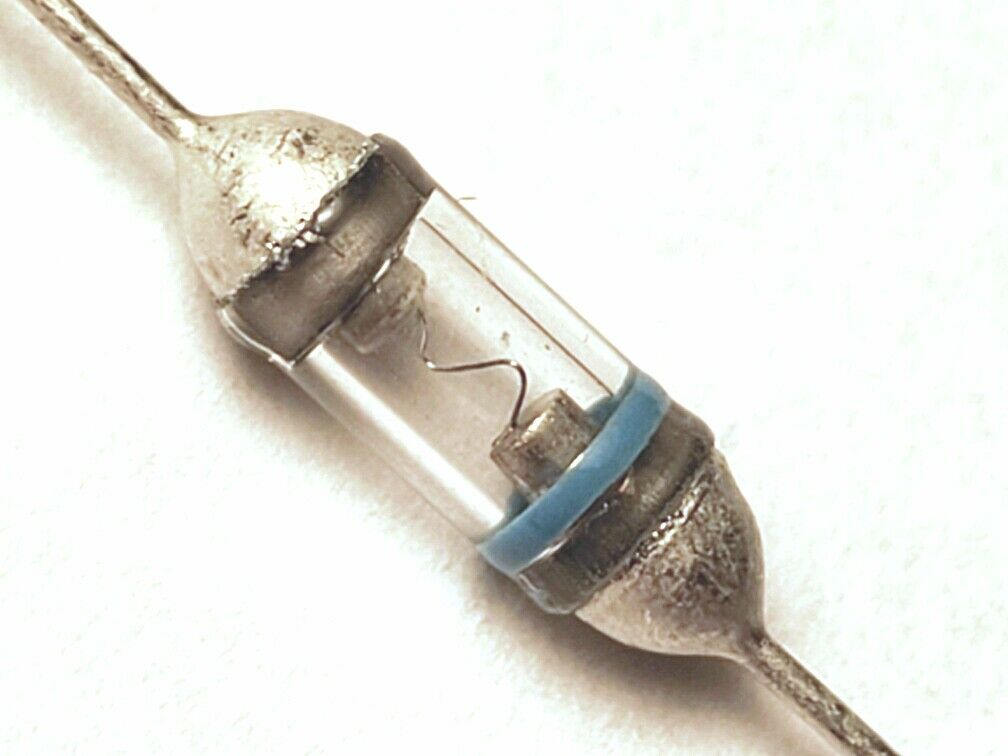-40%
Red Base Crystal Radio Diode Detector Stand with Galena Crystal Cats Whisker-CW3
$ 8.97
- Description
- Size Guide
Description
Red Base Compact GalenaCrystal Radio Diode Detector Stand
.015 PHOSPHOR BRONZE CATS
Whisker
Includes Galena Crystal
Easily replaceable Whisker and Crystal
Positive spring whisker contact
Whisker position can be adjusted by grasping the Ball Handle and pivoting in any direction
6" Wire leads attached
New Model Design Holds the Pivot Ball Securely
Spade terminal at each end of the wire that quickly and easily attach to your radio
Large Size 16mm x 56mm Base
Base has center hole that can be used to attach to your radio
Fully assembled, tested and ready to go.
FACTS ABOUT OLD SCHOOL CRYSTAL DIODES
Measuring forward and back resistance ratios of crystal-and-cats-whisker diode. There is a significant difference
between forward and back resistance readings on an ohmmeter, but the ratio was nowhere close to that of a modern germanium diode,
thus limiting the efficiency of the crystal. However, connecting a germanium diode as a bias with the crystal can make a major
improvements in performance.
Not every contact position on the Galena crystal will perform, so fiddling with the ‘cat's whisker’ to find a sweet spot does take patience and a steady hand.
position to find a sweet spot on the crystal does take patience and some acquired skill.
To change the contact position, gently lift the end of the whisker wire at the contact point and
slide the crystal cup.
Don not bend the whisker too much or it will take a bend and loose the spring tension.
Just lift the whisker slightly 1/16" from the top of the crystal and only then slide the cup.
The "cat whisker", a springy piece of thin metal wire, Hardened wire of about 30 gauge is
commonly used.
The wire whisker is the anode, and the crystal is the cathode.
Cat Whisker:
The "cat whisker", a springy piece of thin metal wire, formed the metal side of the junction. Hardened wire of about 30 gauge was commonly used because it had the right amount of springiness.
Crystals that require a light pressure like Galena and Pyrite were used with the wire cat whisker contact; silicon was used with a heavier point contact,
while Silicon Carbide (Carborundum) could tolerate the heaviest pressure.
Different crystal minerals require just the right amount of pressure by the wire to work; too much pressure causes the device to conduct in both directions.
Cat whisker detector:
It consisted of a pea-size piece of crystalline mineral in a metal holder, with its surface touched by a fine metal wire or needle (the "cat whisker"). The contact between the tip of the wire and the surface of the crystal formed a crude unstable point-contact metal–semiconductor junction, forming a diode. The wire whisker is the anode, and the crystal is the cathode; current can flow from the wire into the crystal but not in the other direction.
Having a lot of patience and a steady hand are needed when you listen with a piece of the rock. But this can also be very rewarding when you can hear the first station using a cats whisker detector.
Please note : This item not a Crystal Radio, but is installed into a Crystal Radio and used to replace a modern Germanium diode with an older technology developed during the 1920's.















